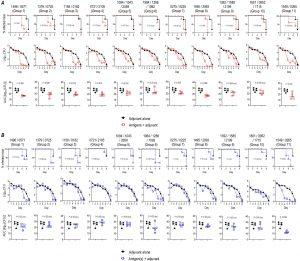Gonorrhea, a pervasive sexually transmitted bacterial infection, has been a medical challenge for decades, with antibiotic resistance complicating treatment. Left untreated, gonorrhea can lead to severe health consequences and increase the risk of contracting other diseases, including HIV. However, recent research has shown a promising path forward in the form of artificial intelligence (AI). In this study, AI helped identify key vaccine components, paving the way for a potential gonorrhea vaccine (Figure1 ).

Figure 1: Efficacy of 26 gonococcal vaccine antigens against N. gonorrhoeae strains MS11 (A) and H041 (WHO X) (B) in the mouse vaginal colonization model. Mice were immunized with combinations of individual antigens (15 µg of each antigen) indicated at the top of each column in the graphs (corresponding NGO numbers, indicated above each column); vaccines were adjuvanted with either 5 µg GLA-SE (groups 1–6 and group 11) or 5 µg GLA-SE plus Al(OH)3 (groups 7–10). Mice were immunized intramuscularly at weeks 0, 3, and 6. Adjuvant control mice received GLA-SE alone. Two weeks post-dose 3, mice in the diestrus phase of the estrous cycle (n = 5/group) were challenged intravaginally with N. gonorrhoeae MS11 (2.6 × 107 CFU) (A) or H041 (WHO X) (3.8 × 107 CFU) (B). Vaginas were swabbed daily to enumerate gonococcal CFUs. In panels A and B, the top rows show times to clearance (Kaplan–Meier curves; groups compared by Mantel-Cox analysis), the middle rows show log10 CFU versus time, and the bottom rows show analysis of AUC (means, ±95% confidence intervals were compared across groups by Mann Whitney’s non-parametric test).
This research harnessed an AI model named Efficacy Discriminative Educated Network (EDEN) to pinpoint potential antigens for a gonorrhea vaccine. These antigens play a vital role in teaching the immune system to recognize and combat the bacteria causing gonorrhea. EDEN not only identified these antigens but also generated scores that accurately predicted the antigens’ effectiveness in reducing bacterial populations of Neisseria gonorrhoeae, the culprit behind the infection.
To validate their findings, researchers applied EDEN to the proteomes of ten clinically relevant Neisseria gonorrhoeae strains. This predictive approach yielded a list of bacterial proteins with the potential to be included in a vaccine. The research team then put these candidates to the test in mouse models.
The study first explored combinations of two or three antigens in mice, and the results were intriguing. It unveiled two proteins associated with cell division that had not previously been known to be exposed on the bacterial cell surface. Blood samples from mice immunized with these proteins could kill bacteria from multiple gonorrhea strains, aligning with EDEN’s predictions.
The research team’s success extended beyond individual tests. By merging the two proteins into a single chimeric protein, they induced an immune response that demonstrated efficacy in both laboratory and animal models. Furthermore, the study uncovered a pivotal mechanism in the clearance of Neisseria gonorrhoeae infection by this vaccine candidate.
While the results are promising, further studies are necessary to determine whether these mechanisms hold in human subjects. The discovery stands as a beacon of hope in the battle against gonorrhea, highlighting the potential of AI-driven research in the pursuit of novel vaccines.
Journal article: Gulati, S., et al., 2023. Preclinical efficacy of a cell division protein candidate gonococcal vaccine identified by artificial intelligence. mBio.
Summary by Stefan Botha
